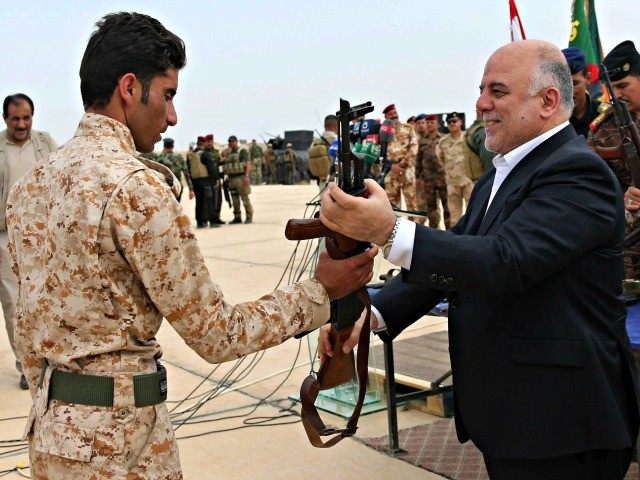Iraqi Prime Minister Haidar al-Abadi is in Washington for his first visit in office and is scheduled for a meeting with President Obama at which he will request a massive increase in military aid against the Islamic State. A senior Iraqi official told Reuters, “We’re talking about billions here… This is a new approach for us because of the scale of the challenge we have ahead. Mosul and Nineveh province and Anbar will cost us a lot.”
After some hair-raising false starts and setbacks, the campaign against ISIS in Iraq is finally making some progress, with the Pentagon estimating that roughly a quarter of the territory seized by the Islamic State has been reclaimed. That leaves 75 percent to go, including the intense battle to retake the terror state’s de facto Iraqi capital of Mosul, as mentioned by the official. Enormous levels of American air power have been necessary to secure all the major victories against ISIS – 2,000 airstrikes in Iraq, plus another 1,400 in Syria, according to PBS.
It is not unreasonable to suppose that finishing the job will be very expensive, and the Iraqi government is currently running some $21 billion in the red. Abadi’s request could add up to ten times the Pentagon’s current allocation for training and arming Iraqi and Kurdish troops.
Iraq wants to “explore obtaining a series of advanced weapons, including unarmed drone aircraft, Apache attack helicopters manufactured by Boeing Co and ammunition,” on a deferred repayment plan, according to the official quoted by Reuters. Given the long training time required for using such advanced equipment in battle, the article suggests that American pilots might be provided along with those Apaches. That might be technically compliant with President Obama’s promise to avoid putting American “boots on the ground” in front-line combat, but those boots will be skimming very close to the ground at high speed.
Critics wonder if putting more expensive hardware into the hands of Iraq units with less-than-stellar combat performance is a wise investment, although there might not be any politically acceptable alternatives, given the reluctance to put U.S. ground troops on the front lines.
PBS quotes Jon Alterman of the Center for Strategic and International Studies wondering if the American public might resist plowing fresh billions into a proxy war with thus-far disappointing results: “There’s a military campaign that the U.S. is helping wage, but it has more internal problems than I think people on either side are willing to admit. The reality is what we are trying to do is very difficult, very complicated and many people question how unified we are with the Iraqi government on what we are trying to do.”
There are also lingering concerns about sectarian divisions in the Iraqi government, although Abadi is generally seen as a significant improvement over his predecessor, Nouri al-Maliki. The Kurds, who have handled some of the toughest fighting against ISIS, have long complained about the Iraqi central government’s reluctance to forward American military aid to forces not directly under its control. Tribal leaders and Shiite militias have made similar complaints, and while the latter have become major players in the drive toward Mosul, there is understandable reluctance to put too much firepower in the hands of Iranian proxies.
Additionally, there are humanitarian concerns about the conduct of Abadi’s government, voiced by Human Rights Watch in a letter to President Obama on the eve of the Iraqi prime minister’s visit. “As militias and government forces have advanced in recent months, violations of the laws of war and other abuses by these forces have increased in the area around Amerli and more recently in and around Tikrit,” wrote HRW. “Recent comments from a range of senior US officials expressing concern about these abuses and their implications for Iraq’s long-term security are very important, but such criticism is undermined by the US’s policy of providing unfettered military aid to the government of Iraq.”
The abuses mentioned by Human Rights Watch include “abductions; summary executions, including beheadings; torture and other ill-treatment; and forcible displacements of thousands of families in areas recaptured from ISIS.”
The group is concerned about “recent statements from Prime Minister Abadi that appear to walk back from – or negate – earlier commitments to address accountability for these serious abuses both by reining in the militias and taking steps to deal with its own forces.” They also criticized Abadi’s government for appointing members of abusive militia groups to government positions and interfering with local and international press freedom, and they asked President Obama to address these issues during his meeting with the Prime Minister.
With these reservations in mind, backing off the Islamic State at a moment when it is finally starting to lose Iraqi territory is not a good strategy, and probably would not sit well with American voters. The Iraqi official who talked to Reuters gave unsubtle hints that his government might turn to Iran for assistance, if it can’t get the weapons it wants from Washington. “ISIS is everybody’s problem now,” he said. “You can’t run away from the problem if it comes to Canada or goes to France.”

COMMENTS
Please let us know if you're having issues with commenting.